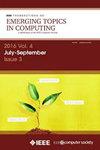FedRDF:联盟学习中抵御中毒攻击的稳健动态聚合函数
IF 5.4
2区 计算机科学
Q1 COMPUTER SCIENCE, INFORMATION SYSTEMS
IEEE Transactions on Emerging Topics in Computing
Pub Date : 2024-10-10
DOI:10.1109/TETC.2024.3474484
引用次数: 0
摘要
联邦学习(FL)代表了一种很有前途的方法,可以解决与集中式机器学习(ML)部署相关的典型隐私问题。尽管具有众所周知的优势,但FL很容易受到拜占庭行为和中毒攻击等安全攻击,这可能会大大降低模型的性能并阻碍收敛。现有方法的有效性,以减轻复杂的攻击,如中值,修剪平均,或克鲁姆聚集函数,只在特定的攻击的情况下部分证明。我们的研究引入了一种利用傅里叶变换(FT)的新型鲁棒聚合机制,该机制能够有效地处理复杂的攻击,而无需事先了解攻击者的数量。利用这种数据技术,将FL客户端产生的权重投影到频域以确定其密度函数,选择频率最高的权重。因此,排除了恶意客户端的权重。我们提出的方法针对各种模型中毒攻击进行了测试,显示出优于最先进的聚合方法的性能。本文章由计算机程序翻译,如有差异,请以英文原文为准。
FedRDF: A Robust and Dynamic Aggregation Function Against Poisoning Attacks in Federated Learning
Federated Learning (FL) represents a promising approach to typical privacy concerns associated with centralized Machine Learning (ML) deployments. Despite its well-known advantages, FL is vulnerable to security attacks such as Byzantine behaviors and poisoning attacks, which can significantly degrade model performance and hinder convergence. The effectiveness of existing approaches to mitigate complex attacks, such as median, trimmed mean, or Krum aggregation functions, has been only partially demonstrated in the case of specific attacks. Our study introduces a novel robust aggregation mechanism utilizing the Fourier Transform (FT), which is able to effectively handle sophisticated attacks without prior knowledge of the number of attackers. Employing this data technique, weights generated by FL clients are projected into the frequency domain to ascertain their density function, selecting the one exhibiting the highest frequency. Consequently, malicious clients’ weights are excluded. Our proposed approach was tested against various model poisoning attacks, demonstrating superior performance over state-of-the-art aggregation methods.
求助全文
通过发布文献求助,成功后即可免费获取论文全文。
去求助
来源期刊

IEEE Transactions on Emerging Topics in Computing
Computer Science-Computer Science (miscellaneous)
CiteScore
12.10
自引率
5.10%
发文量
113
期刊介绍:
IEEE Transactions on Emerging Topics in Computing publishes papers on emerging aspects of computer science, computing technology, and computing applications not currently covered by other IEEE Computer Society Transactions. Some examples of emerging topics in computing include: IT for Green, Synthetic and organic computing structures and systems, Advanced analytics, Social/occupational computing, Location-based/client computer systems, Morphic computer design, Electronic game systems, & Health-care IT.
 求助内容:
求助内容: 应助结果提醒方式:
应助结果提醒方式:


